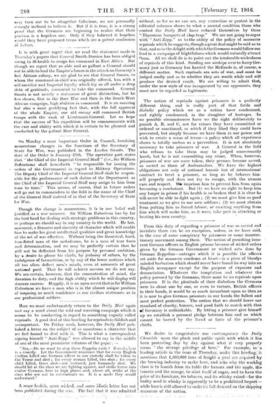The notion of reprisals against prisoners is a perfectly different
thing, and is really part- of that futile and diabolic policy which we as a nation have condemned, and rightly condemned, in the slaughter of hostages. :In no possible circumstances have we the right deliberately to punish A, B, and C, not for crimes they have committed or ordered or sanctioned, or which if they liked they could have prevented, but simply because we have them in our power and wish to create a sense of terror—a policy which all experience shows is totally useless as a preventive. It is not absolutely necessary to take prisoners of war. A General in the field who refuses to take them may be judged - unnecessarily harsh, but he is not committing any crime: When, -however. prisoners of war are once taken, their persons become sacred. as sacred as those of Ambassadors. Wo have the highest obligations not only of national honour but of international contract to treat a prisoner, as long as he behaves hini- self properly and does not try to escape, with the utmost care and respect. We imprison him to prevent him from again becoming a combatant. But (1) we have no right to keep him any longer in prison if his health is so broken that it is clear he will never be able to fight again ; (2) we must give him as goOd treatment as we give to our own soldiers ; (3) we must abstain from putting him to forced labour, or exacting anything from him which will make him, as it were, take part in attacking or beating his own country.


































 Previous page
Previous page